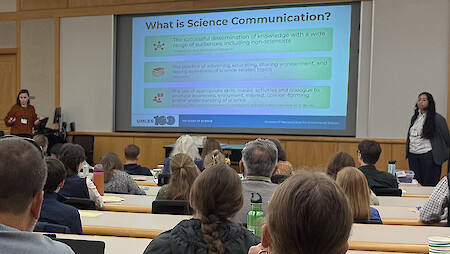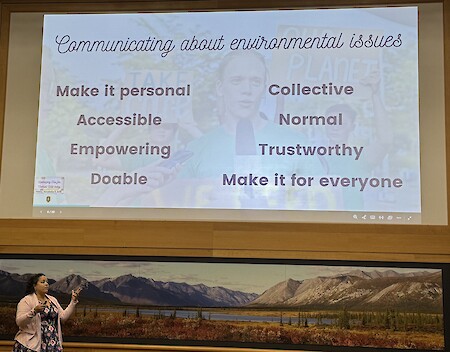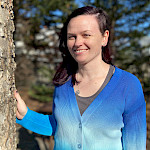Centering People in Conservation
Annie Carew ·As dorky as it is, I look forward to the annual Chesapeake Watershed Forum all year. When late autumn rolls around, I start daydreaming about the network of paths at the National Conservation Training Center festooned with fall foliage. At the Forum, I get to meet hundreds of people with an important common interest: the Chesapeake Bay. Many of us are scientists, but there are also community advocates, organizers, and educators. This intersection of interests is an exciting place to meet and talk.

Conferences are, in many ways, mini-reunions for long-time partners and collaborators. We saw the other members of the Chesapeake Monitoring Cooperative, our collaborators from the Severn River Association, and our neighbors at the Alliance for the Chesapeake Bay. We ate Severn River oysters and walked along the Potomac River. “Fun” is the only word for it. The Chesapeake Watershed Forum celebrated its twentieth anniversary this year. This year’s Forum theme, “Shaping the Future of Conservation with Human-Centered Approaches,” resonated strongly with IAN’s approach to science and—in my opinion—the future of science.
Our approach to science at IAN is action-driven. We believe that science can and should be used to make the world a better place. In our science communication workshop at this year’s Forum, we drove this point home repeatedly. We as scientists can motivate people to enact change through effective science communication. These changes are centered around communities and how they interact with the natural world. Our work across multiple continents highlights the importance of humanity’s connection to the environment. We want people to come together, share concerns, and identify their shared priorities for environmental management. This entire approach is human-centered, and humans love stories. If we can use science communication tools to construct a compelling narrative around science, we can connect to people on issues that they care about. This level of connection is a powerful motivator. Centering people in our science makes science relevant and actionable.

The opening plenary of the Forum wasn’t a talk about science, or the challenges facing the Bay, or the future of conservation science. Larissa Johnson talked about fun. She walked us through exercises to keep our brains active and engaged, and she reminded us to laugh. Even forced laughter has physical and mental health benefits. The shared, awkward joy of spelling the alphabet with my foot (and then my other foot) reminded me of fun weekends in school. I was a theater kid; we began every day with games and nonsense. Tapping into this joy sets the stage for mindful, meaningful work, and reminds us that we are all human. Shared joy unites people and opens us up to conversation. This reminder was a poignant way to open the weekend.
Every session I attended emphasized the theme beautifully. I attended a session on the Shenandoah Valley Black Heritage Project, which is spearheading a project to map the locations of Black cemeteries and “the history of people being put in disfavored locations.” This session highlighted the connection between people, land, and history. I was reminded of our recent publication on parachute science when Monica Robinson spoke about how these communities can be slow to trust external scientists. Meaningful community engagement requires trust; sometimes, we as outsiders rely on existing community leaders to bridge that gap. Establishing trust prioritizes human connection. This approach aligns with our values and the Forum theme, and I believe it is the best path toward meaningful conservation.
Conferences like the Watershed Forum are important to our work. Gathering with our project partners and other practitioners allows us to maintain connections, brainstorm future collaborations, and share knowledge. Perhaps most importantly, it reminds us why we love our work.
About the author
Annie Carew

Annie Carew graduated from UMCES with a Master's degree in 2019. Her thesis research examined the effects of genetic identity on aquatic plant restoration success. Annie's research interests include coastal management and climate adaptation. At IAN she works on workshop facilitation, data visualization, document design, data analysis, and social media management. She is an enthuiastic birder and botanist, and can often be found wandering in the woods on the weekends.